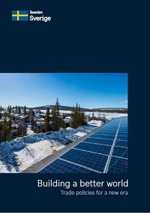Building a better world - Trade policies for a new era
Published

The world is going through broad societal changes. Digitalization, automation and the transition to a fossil-free future mean that we face a transformation comparable to the industrial revolution. In addition, Russia’s war of aggression against Ukraine has created a new geopolitical situation. Russia’s brutal war is not only an attack on Ukraine, the European security order and the UN Charter, but also on peace, prosperity and democracy more broadly. Generations of European will live with the consequences of it. We are entering a new era.
Download:
In the same way that broad-based reforms during the 19th and 20th centuries benefited our societies then, the new era requires updated social contracts both domestically and globally. The rise of nationalist and protectionist sentiments poses a threat to this vision. An inward-looking EU could create a viscous circle of disintegration and declining competitiveness. Ultimately, it would harm our position globally. Instead, an open and forward-looking EU trade agenda that strengthens economic bonds with partners that respect international rules and norms is needed. According to the Task Force, three basic elements should frame such an agenda: the transition to a fossil-free and resource efficient economy, digitalisation and economic competitiveness. Improved social sustainability as well as an ambitious global development program serve as the base of the framework. The new geopolitical situation further underlines the need for this agenda. By strengthening the internal market and trade relations with other countries we create the economic resilience needed to counter Russia’s war of aggression against Ukraine. It also means that the transition away from fossil-fuels needs to happen faster.

 X
X